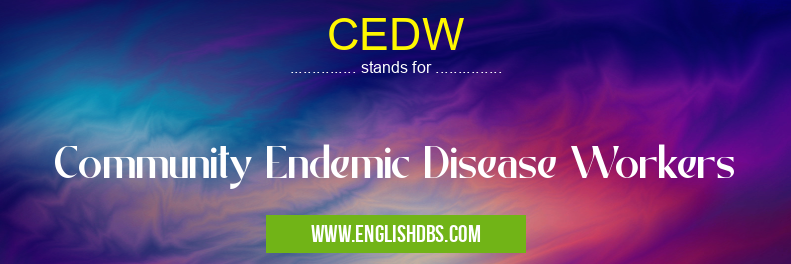What does CEDW mean in DISEASES
Community Endemic Disease Workers (CEDW) are health professionals who work to reduce the prevalence of various illnesses and diseases in local communities. They work to identify, prevent, and treat illnesses caused by infections or environmental factors such as bacteria, viruses, toxins, and other organisms. CEDWs play a critical role in public health by engaging with local residents and organizations to create effective health initiatives that help to reduce rates of illness within communities.

CEDW meaning in Diseases in Medical
CEDW mostly used in an acronym Diseases in Category Medical that means Community Endemic Disease Workers
Shorthand: CEDW,
Full Form: Community Endemic Disease Workers
For more information of "Community Endemic Disease Workers", see the section below.
What is CEDW?
CEDW stands for Community Endemic Disease Workers. These workers are professionals engaged in a variety of activities aimed at reducing the spread of disease in local communities. This includes providing education on proper hygiene and sanitation practices; diagnosing, treating, and preventing infectious diseases; monitoring population health trends; reporting cases of communicable disease; conducting surveillance for emerging disease outbreaks; and making recommendations regarding preventive measures against infection. CEDWs are an integral part of the healthcare system since they help to ensure the overall wellbeing of the community by addressing potential risks before they become widespread.
Roles & Responsibilities
The roles and responsibilities of CEDWs include educating members of the community on preventive measures against infection such as handwashing and safe food handling, identifying potential sources of ongoing or recurring illness such as contaminated water supplies or poor hygienic practices, diagnosing —and treating—communicable diseases like malaria or dengue fever, conducting surveillance activities to detect new outbreaks early on so they can be addressed quickly before they become widespread, providing advice to healthcare providers regarding diagnosis & treatment protocols for various illnesses according to current best practice guidelines. Additionally, CEDWs may also coordinate outreach programs designed to promote healthy behaviors among vulnerable populations such as children or elderly individuals living in poverty-stricken areas where access to medical care is limited or nonexistent.
Essential Questions and Answers on Community Endemic Disease Workers in "MEDICAL»DISEASES"
What does CEDW stand for?
CEDW stands for Community Endemic Disease Workers. These are workers in public health areas that specialize in preventing and managing the spread of endemic diseases, which are illnesses or infections that are locally widespread and regularly found among a particular population.
What is the role of community endemic disease workers?
The role of Community Endemic Disease Workers is to provide healthcare services, education, counseling, and support to people affected by endemic diseases in their local communities. They work closely with doctors, nurses, epidemiologists, social workers and other public health personnel to identify trends and improve access to preventive care.
How do CEDWs help prevent the spread of disease?
CEDWs typically play an important role in helping to prevent the further spread of endemic diseases. They seek to identify risk factors associated with outbreaks and promote measures such as vaccination programs, proper hygiene practices, lifestyle changes (e.g., quitting smoking), etc., which may reduce the risk or severity of the disease in their local area.
How can I become a Community Endemic Disease Worker?
To become a Community Endemic Disease Worker you must have either a bachelor's degree or master's degree in public health or related field. You must also be able to obtain certification from your state’s health department in order to practice as a CEDW.
What skills do I need to be an effective CEDW?
To be an effective CEDW it is important that you possess strong analytical skills so that you can interpret data from surveys and studies related to endemic diseases; excellent communications skills both verbal and written so that you can effectively share information related to these illnesses; organizational skills so that visits are documented accordingly; empathy towards those affected by these diseases; and knowledge of current methods used for treating them.
Are there any risks associated with being a CEDW?
As with all jobs working in healthcare there are some inherent risks associated with being a CEDW such as exposure to infectious agents through contact with patients who carry them but these risks are minimized by following safety protocols like wearing gloves when necessary during examinations or treatments. Additionally, since part of their job also requires extensive travel outside of offices they may face additional risks associated with traffic accidents or other unforeseen situations while on assignment away from home base.
How much does a CEDW make annually?
Salaries for Community Endemic Disease Workers vary depending on experience levels and location but generally range between $38K-$70K/year on average.
Final Words:
All in all, Community Endemic Disease Workers (CEDW) are essential members of any healthcare system since they play a crucial role in identifying & preventing infectious diseases from spreading within communities while also providing necessary treatments & resources for those suffering from communicable illnesses like malaria or dengue fever. Through their efforts towards prevention & intervention in public health episodes these workers ensure that local populations remain healthy & avoid long-term impacts from infective agents like bacteria & viruses which could greatly reduce quality of life if left untreated over time. The importance of their work cannot be understated — without them our hospitals would soon be filled with ill & suffering individuals who had no access to medical care earlier on!
